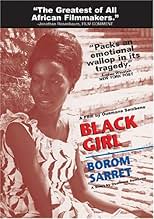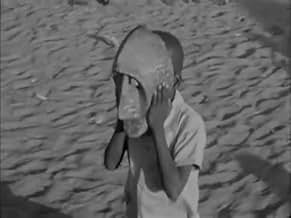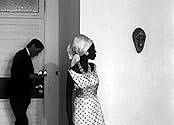IMDb RATING
7.4/10
6.3K
YOUR RATING
A black girl from Senegal becomes a servant in France.A black girl from Senegal becomes a servant in France.A black girl from Senegal becomes a servant in France.
- Awards
- 2 wins
Anne-Marie Jelinek
- Madame
- (as Anne-Marie Jelinck)
Raymond Lemeri
- Old Male Guest
- (as Raymond Lemery)
Suzanne Lemeri
- Old Female Guest
- (as Suzanne Lemery)
Toto Bissainthe
- Diouana
- (voice)
Robert Marcy
- Monsieur
- (voice)
Sophie Leclair
- Madame
- (voice)
- (as Sophie Leclerc)
Ousmane Sembene
- The Teacher
- (uncredited)
Storyline
Did you know
- TriviaThis is believed to be the first feature film made by a black African in sub-Saharan Africa.
- GoofsWhen Diouana goes to bed, she is wearing her wig. When wakes up, she is in curlers.
- Quotes
Diouana: Never again will the mistress scold me. Never again will she say: "Diouana make coffee." Never again: "Diouana, make rice." Never again: "Diouana, take off your shoes." Never again: "Diouana, wash this shirt." Never again: "Diouana, you're lazy." Never will I be a slave. I did not come here for the apron or the money. Never will she see me again. Never will she scold me again. Never again Diouana. Never will I see them again.
- Alternate versionsA 70 min. version includes a color sequence. It was cut to adjust to the length requirements of the French producers.
- ConnectionsFeatured in Twenty Years of African Cinema (1983)
Featured review
An unwavering symbolic tale of colonialism
Black Girl presents an allegory for European colonialism in Africa through the lens of a Senegalese woman who secures a job in France. Sembene makes careful directorial choices to emphasize the contrasts between Senegal and France and the divide between Diouana's expectations for France and the reality. One of these choices is the use of nonlinear time - the film opens with her arrival in France and shows her interactions with Madame, then goes back in time to when she secured the job in Senegal. The striking difference between these two times is Diouana's attitude. In Senegal, when she is offered the job she is overjoyed at the opportunity, especially since it involves taking care of kids. However, when she gets there, she doesn't see the kids, is told to do all the work around the house, and is berated by Madame for being lazy. Seeing Diouana's frustrating situation is more resonant in only realizing afterwards how excited she was for the job going in. Her body language is a world apart, as in France she never smiles and has no energy but in Senegal was beaming when she got the job, and was so excited to see what France was like. I also like Sembene's choice to have her inner monologue as narration, as that further serves to put the audience inside Diouana's head. Her perspective is essential to understanding the way she is completely devastated by her experience, and from the first scenes of the film we are put in her point of view as we look out the window onto France through her eyes. Madame presented it as a great opportunity for her to make money and do what she enjoys - be with children - but then doesn't give her what she promised and by the time she does, her condescension and demands have sucked all the life from Diouana. You can interpret the symbolism of the film in many ways, and mine may change, but my impression now is that the film symbolizes the way Europe seemed to offer to help African countries but really just exploited them for all their resources, denied them the opportunity promised to give the next generation a better life, and then saw it as a surprising, random, unfortunate event when the countries are even worse off. The exploitation element is made explicit by Diouana's narration at the end, where she talks about being done being a slave. The mask is another interesting symbol in the film, one of African culture. We see how Diouana shares it with the family initially but they then appropriate it and treat it as their own, and at the end of the film Monsieur is haunted by it as the legacy of his sins. Really smart and well layered, and with a poignant ending, Black Girl is an excellent allegory.
- andrewroy-04316
- May 19, 2020
- Permalink
- How long is Black Girl?Powered by Alexa
Details
- Release date
- Countries of origin
- Language
- Also known as
- Die Schwarze aus Dakar
- Filming locations
- Production companies
- See more company credits at IMDbPro
- Runtime1 hour 5 minutes
- Color
- Sound mix
- Aspect ratio
- 1.37 : 1
Contribute to this page
Suggest an edit or add missing content










